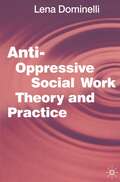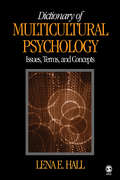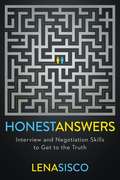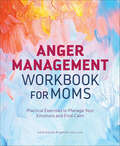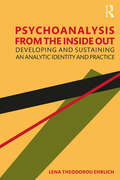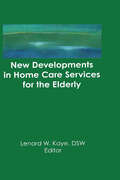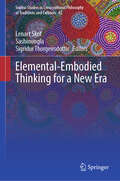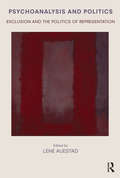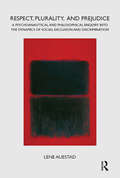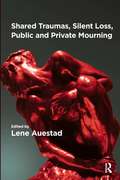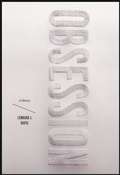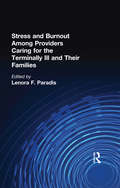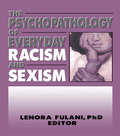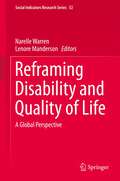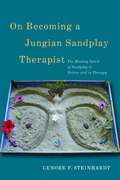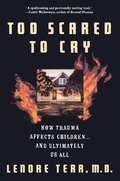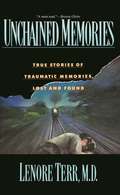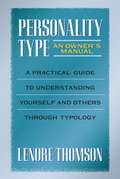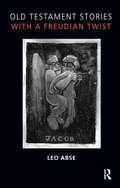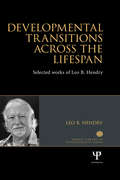- Table View
- List View
Anti Oppressive Social Work Theory and Practice
by Lena DominelliThis book, by one of the leading theorists of social work, tackles a subject of crucial importance to students and practitioners alike: how social workers can enable their clients to challenge and transcend the manifold oppressions that disempower them (whether through poverty, disability, mental illness, etc. ). It moves from a discussion of social work's purpose and ambitions to an exposition of theory and, from there, to the practice arenas of working with individuals, in groups, within organisations, and within a wider social and political context.
Dictionary of Multicultural Psychology: Issues, Terms, and Concepts
by Lena E. Hall"There appears to be a burgeoning lexicon of terms and concepts pertinent to multiculturalism. Unfortunately, this increase in the number of terms and concepts seems to be colliding with a decrease in a shared understanding of what they mean. A dictionary style volume for such terms seems an admirable and overdue quest." -William H. George, University of Washington This dictionary is an up-to-date volume that contains numerous references to relevant concepts and terms in the field of multicultural psychology. Professor Lena Hall has collected, studied, and analyzed a multitude of terms in her eleven years of teaching multicultural psychology, and she has gathered them together in this handy, accessible reference book. Key Features Definitions are written in concise language for easy comprehension. Standard dictionary format is familiar and convenient to use, making this book a handy reference for students and professionals alike who wish to clarify a term or broaden their knowledge on a topic. Relevant reference sources are included along with each entry, enabling students to do further reading on concepts they have learned. Dictionary entries are excellent starting points for stimulating class discussions and creative research and written assignments. The Dictionary of Multicultural Psychology is a highly useful resource for undergraduate psychology students. The book is recommended as a classroom supplement for courses in psychology and multiculturalism, as well as for professionals and graduate students working with multicultural populations for certification. Lena Hall is associate professor at Nova Southeastern University. She obtained her BS in Psychology from York University, her MA and MED from Columbia University, and her PhD in Counseling Psychology from University of Florida. She conducts seminars, presents papers, and teaches classes in multicultural psychology. She is presently involved in cross-cultural research on substance abuse. Her latest publication is Issues in Multicultural Psychology, a textbook for undergraduate students.
Macht und Ohnmacht: Bewältigungsstrategien und Krisenkompetenz am Beispiel von Kafkas Roman „Der Prozess“ (essentials)
by Regine Hinkelmann Lena HinkelmannLena und Regine Hinkelmann stellen in diesem essential dar, welchen Beitrag die psychologische Ausdeutung des Werkes ,,Der Prozess" von Franz Kafka zur bestehenden Forschungslandschaft leisten kann. Mithilfe einer strukturierten Kafka-Analyse zeigen sie auf, welche manifesten Auswirkungen die physische und die psychische Gewalt des Machtsystems auf die Pers#65533;nlichkeitsstruktur eines Individuums haben k#65533;nnen. Aufgrund der gesellschaftlichen Relevanz stellen die Autorinnen den Transfer dieses Werkes der Weltliteratur auf den heutigen arbeitsweltlichen Anforderungskontext her und arbeiten dabei insbesondere die Bedeutung des Emotionsmanagements und professioneller Krisenkompetenz heraus.
Honest Answers: Interview and Negotiation Skills to Get to the Truth
by Lena SiscoBECOME A MASTER AT NEGOTIATION AND COMMUNICATIONNever go into an important conversation feeling unheard, unprepared, or uninformed again—apply the proven SISCO method for communication to become a master negotiator, trusted interviewer, and engaging conversationalist. No matter the conversation, detecting honesty and persuading others to be honest are some of the most valuable skills you can learn. With these skills, you can master your daily conversations and interactions with others. The Strategic Interviewing Skills and Competencies (SISCO) Method will help you see the full picture, have all the facts, and make effective decisions.Former Navy interrogator, Lena Sisco, created this method during challenging investigative and information-gathering interviews. Her 5-step program focuses human-to-human interaction. When you can gain someone&’s trust you can get truth in any scenario. She teaches readers how to validate their gut feeling when they think someone is lying, unassumingly control a conversation, and persuade others to be honest.These skills are not only applicable in an interrogation room, but they can be relevant in everyday life. In this book, you will learn how to:Apply the strategic interviewing skills behind the SISCO method to your everyday life to discover the information and the honest answers you need.Create an environment of trust that will facilitate the fact finding necessary to be more effective at your job while encouraging others to be more accountable.Control the signals you may or may not be inadvertently sending to others.Know the right words to say during a disagreement in order to de-escalate conflict, gain respect, and create a win-win situationNot only does she teach you techniques and methods to negotiate and interview with confidence, she shares the neuroscience behind why they are effective. You will be able to interpret patterns of behavior and influence positive behaviors in others, as well as enhancing the effectiveness of your communication practices; both verbal and nonverbal.
Anger Management Workbook for Moms: Practical Exercises to Manage Your Emotions and Find Calm
by Lena Suarez-AngelinoLearn to manage your anger with effective strategies and exercises Cultivate skills for coping with your anger to better express yourself, maintain healthy relationships, and improve your overall quality of life. From identifying unhelpful thoughts to exploring triggers, discover ways to handle your anger and find healthier outlets for it. In this workbook, you'll learn effective strategies for better dealing with your emotions, staying calm in stressful moments, and becoming the best mom you can be.Confidently address your anger—Exercises like deep breathing and writing an apology letter help you develop coping skills.Relate to other mothers—Insightful case studies show you how anger affects moms like you.Learn techniques for processing anger—Look at past behaviors and reactions, recognize how things could have been handled differently, and move forward.Understand your anger and how to handle your feelings in a healthy way.
Psychoanalysis from the Inside Out: Developing and Sustaining an Analytic Identity and Practice
by Lena Theodorou EhrlichIn the face of considerable scepticism over the function and effectiveness of psychoanalysis, Lena Ehrlich demonstrates how analysis is unique in its potential to transform patients at an emotionally cellular level by helping them access and process long-standing conflicts and traumatic experiences. Using detailed clinical vignettes, the author illustrates that when analysts practice from the inside out, i.e. consider that external obstacles to initiating and deepening an analysis inevitably reflect analysts’ fears of their internal world and of intimacy, they become better able to speak to patients’ long-term suffering. This book, free from psychoanalytic jargon, stands out in its ability to help readers feel more effective, confident, and optimistic about practicing psychoanalysis by providing insights and recommendations about beginning and deepening analysis and sustaining oneself as an analyst over time. It will appeal to both beginners and experienced analysts, as well as supervisors, educators, and those interested in the workings of their minds and in building more intimate relationships.
Attention-Deficit Hyperactivity Disorder in Adults and Children
by Lenard A. Adler Thomas J. Spencer Timothy E. Wilens Lenard A. Adler Thomas J. SpencerAttention-Deficit Hyperactivity Disorder (ADHD) is a chronic neurobehavioral disorder characterized by persistent and often acute distractibility, hyperactivity, and impulsivity. It is a condition usually associated with children but in recent years the diagnosis of ADHD in adults has risen significantly. ADHD often coexists with a wide array of other psychiatric illnesses, including depression and bipolar disorder, thus complicating its assessment and management. In Attention-Deficit Hyperactivity Disorder in Adults and Children, a team of world renowned experts bring together the recent research in this area and cover the history, diagnosis, epidemiology, comorbidity, neuroimaging, and a full spectrum of clinical options for the management of ADHD. The wide ranging, detailed coverage in this text will be of interest to psychiatrists, psychologists, social workers, coaches, physicians, or anyone who wants to develop a deeper understanding of the etiology, characteristics, developmental process, diagnostics, and range of treatment modalities.
New Developments in Home Care Services for the Elderly: Innovations in Policy, Program, and Practice
by Lenard W KayeThis anthology responds to the recurring call for quality in home care service provision. It presents to agency administrators, managers, supervisors, and front line service providers a set of the most up-to-date policy, program, and practice developments in the field. Each contributor to New Developments in Home Care Services for the Elderly explores issues of client/staff diversity and the challenges associated with working with clients grappling with disabling conditions.Contributors in New Developments in Home Care Services for the Elderly explore issues of client/staff diversity and the challenges associated with working with clients grappling with various disabling conditions. Topics addressed include: alternative organizational models in home care the importation of high technology services into the home legal and ethical issues in home health care counseling homebound clients and their families clinical assessment tools and packages case management and the home care client home care entitlements and benefits evaluating and monitoring the effectiveness of in-home care marketing home health care services home care service experiences in other countriesNew Developments in Home Care Services for the elderly covers a continuum of care ranging from housekeeping services to self-care education, teaching, and training services to nursing and medically related services. Consequently, the information contained within this volume is of immediate relevance to a multidisciplinary audience having both direct (field) and indirect (office) service responsibilities in the home care organization. Social workers, nurses, business administrators, and public health professionals will find this an invaluable guide for providing effective home care services.
Elemental-Embodied Thinking for a New Era (Sophia Studies in Cross-cultural Philosophy of Traditions and Cultures #42)
by Lenart Škof Sigridur Thorgeirsdottir SashinunglaThis collection responds to widespread, complex, and current environmental challenges by presenting eleven original essays on a new elemental-embodied approach in environmental humanities. This approach has a special focus on elemental and indigenous philosophies as well as localized experiences of terrestrial forces: from earthquakes and eruptions to pandemics and natural disasters. Representing a shift in modern Western scientific and disembodied thinking of nature, this edited book approaches the question of relationality and intertwining of human and natural being by utilizing the elemental-embodied methodologies within philosophy of embodiment and nature. Supported by research in cognitive sciences, the contributors represent the experiential and affective turn within research into human cognition. As embodied, the human being is embedded and interacting with all there is. The aim of this edited volume is to indicate new paths toward regaining our access to natural being within usand thus toward reconnecting with the natural environment and the things and beings around us in a new, environmentally enhanced way. It appeals to researchers and students working in many fields, predominantly in philosophy, as well as religious and environmental studies.
Nationalism and the Body Politic: Psychoanalysis And The Rise Of Ethnocentrism And Xenophobia (The New International Library of Group Analysis)
by Lene AuestadThis volume aims to question the recent revival of neo-nationalist policies in the light of what unconscious fantasies are involved in these developments. It examines both recent movements of right-wing extremism and the way in which rearticulated neo-ethnic ideas have been adopted by mainstream politicians and in mainstream public discourse. Politicians from other than the right-wing populist parties have tended to resist specific ways of talking that are considered too extremist, rather than their underlying frame of interpretation. Governments across Europe have adopted anti-immigrant and anti-Roma policies. Xenophobia and hostility towards 'others' is on the rise, along with appeals to "Tradition and Security". 'Cultures of fear' are linked with fantasies of fusion or 'imagined sameness'. Alongside the image of the nation as a mother and/or father, Reich (1933) called attention to the fantasy of the nation as a body, echoed in Money-Kyrle's (1939) characterization of 'group hypochondria' in connection with the burning of witches and heretics.
Psychoanalysis and Politics: Exclusion and the Politics of Representation
by Lene AuestadThis book examines the nature of social exclusion and the aspects of the politics of representation in the social, interpersonal, and political field. It questions how psychoanalysis can be used to think about the invisible and subtle processes of power over symbolic representation.
Respect, Plurality, and Prejudice: A Psychoanalytical and Philosophical Enquiry into the Dynamics of Social Exclusion and Discrimination
by Lene AuestadThis book helps us understand the current resurgence of social prejudice against ethnic minority groups, the logics of scapegoating and the resulting violence. Our time is characterised by a growth in expressed hostility and violence towards people who are perceived as 'others'. Hatred towards and discrimination against minorities is on the rise. This book presents a new understanding of prejudice, racism, antisemitism, xenophobia, islamophobia, sexism and homophobia. It combines philosophy with psychoanalytic thinking, sociology and psycho-social studies, analysing the unconscious elements of social processes. The author makes a case for framing a questioning of prejudice, not in terms of normality versus pathology or deviance, but in what is socially unconscious. Hypocrisy and double standards are inherent in our social practices, reflecting the contradictions present in our thinking about these issues: that we both believe and do not believe in equality.
Shared Traumas, Silent Loss, Public and Private Mourning: Shared Traumas, Silent Loss, Public and Private Mourning
by Lene AuestadThis book questions the junctions of the private and the public when it comes to trauma, loss, and the work of mourning - notions which, it is argued, challenge our very ideas of the individual and the shared. It asks, to paraphrase Adorno, 'What do we mean by "working through the past"?, 'How is a shared work of mourning to be understood?', and 'With what legitimacy do we consider a particular social or cultural practice to be "mourning"?' Rather than aiming to present a diagnosis of the political present, this volume instead takes one step back to pose the question of what mourning might mean and what its social dimension consists in. Contributors reflect on the trauma of the Holocaust, the after-effects of the Vietnam War in the US, the Lebanese war-torn experience, victims of the Pacific War in Taiwan, and the Chilean dictatorship.
Educational Psychology Practice
by Thomas Szulevicz Lene TanggaardThis book sets out a proposal for applying psychological and educational psychology concepts to improve work with children and young people. It also suggests how some of the criticism aimed at pedagogical-psychology practice can be answered. In several respects educational psychology practice seems to be in a transition phase and could even be said to be suffering an identity crisis: educational establishments and education policy alike are looking for different skills than those the psychology profession traditionally provides, and people are generally questioning the relevance and applicability of pedagogical-psychological counseling. The book is based on the fundamental premise that good professional practice is contingent upon circumstances that allow practitioners to apply their knowledge, experience and skills in the specific encounter with a specific task. This means that the ability to act pragmatically and creatively is, and will increasingly be, an important skill not only for educational psychologists, but also for psychologists in general. In other words, psychologists must be able to contribute to tasks in new ways and new contexts when required. Intended primarily for students of psychology, school psychologists and other professional groups that provide counseling in schools, the book is also a valuable resource for the various groups that use pedagogical-psychology tools and insights in their work with children and young people.
Obsession: A History
by Lennard J. DavisWe live in an age of obsession. Not only are we hopelessly devoted to our work, strangely addicted to our favorite television shows, and desperately impassioned about our cars, we admire obsession in others: we demand that lovers be infatuated with one another in films, we respond to the passion of single-minded musicians, we cheer on driven athletes. To be obsessive is to be American; to be obsessive is to be modern. But obsession is not only a phenomenon of modern existence: it is a medical category -- both a pathology and a goal. Behind this paradox lies a fascinating history, which Lennard Davis tells in "Obsession". Beginning with the roots of the disease in demonic possession and its secular successors, Davis traces the evolution of obsessive behavior from a social and religious fact of life into a medical and psychiatric problem. From obsessive aspects of professional specialization to obsessive sex and nymphomania, no variety of obsession eludes Davis's graceful analysis. "Obsession" also considers the clinical definition of the condition: Davis investigates the huge increase (estimates suggest up to 600-fold) in diagnosis of obsessive-compulsive disorder over the past thirty years. Surveying the many ways in which doctors today treat OCD, he points out the limitations of and contradictions within the biological definitions of the disease. Impassioned, witty, and learned, "Obsession" is for anyone -- from compulsive hand washers to professional psychologists -- who has been fascinated by, struggled with, or cultivated obsession.
Stress and Burnout Among Providers Caring for the Terminally Ill and Their Families
by Lenora F ParadisWritten primarily by individuals with hands-on hospice experience, this crucial volume identifies sources of stress among hospice workers and provides workers and managers with strategies to cope with those stressors. It is an enlightening examination of diverse theoretical perspectives and a much needed investigation on stress and burnout for hospice providers and caregivers. Readers will find concrete suggestions for the alleviation of stress and burnout in their work with the terminally ill, as well as theoretical and research discussions. The authors explore a wide range of subjects and problems faced by nurses, physicians, social workers, caregivers, hospice directors, and volunteers. They also discuss the many factors in hospice care that may foster unfavorable stress reactions and eventual burnout among hospice professionals. Current literature on job stress and burnout among those who care for the terminally ill is examined and a model of stress and burnout specific to hospice caregivers is presented. The authoritative chapters also identify theories of stress and burnout and the distinction between the two. Anyone who deals with chronic and terminal illness should read Stress and Burnout Among Providers Caring for the Terminally Ill and Their Families. Hospice caregivers and volunteers, social works, clergy, and health care professionals who work with cancer, renal dialysis, and heart and stroke patients will appreciate the attention given to a subject that has received little study.
The Psychopathology of Everyday Racism and Sexism
by Lenora FulaniIn this enlightening book, women of color eloquently and honestly articulate the impact of racism, sexism, and poverty on their personal lives and on the histories of their people. They express anger at the failure of traditional psychiatry and psychology--which tend to advocate assimilation, meaning the denial of one's cultural and historical identity--to understand the struggles and problems in their lives. The contributors to The Psychopathology of Everyday Racism and Sexism--who come from both inside and outside the psychological disciplines--examine newer therapies in which women are encouraged to identify and express emotional reactions to other people, racism, and abuse and to expose the humiliation they feel. These new therapeutic processes--representing a milestone in psychological theory and practice--help women of color develop their historical identity and reject socially-induced shame and degredation.The editor of this vital book is Lenora Fulani, a developmental psychologist and an active political leader. Dr. Fulani explores how a lack of power over one's life and deprivation of a sense of oneself as historical are commonly associated with psychological problems. The added stress of low social status, sexual exploitation, poverty, abuse, and drug and alcohol problems, result in an enormous sense of failure and incredible vulnerability to emotional stress. With passion and compassion, The Psychopathology of Everyday Racism and Sexism advocates an empowering sense of community based on the power of and love for the oppressed.
Reframing Disability and Quality of Life: A Global Perspective
by Lenore Manderson Narelle WarrenThis volume brings together two parallel fields of interest. One is the understanding among psychologists and other social scientists of the limits to psychometric measurement, and the challenges in generating information about quality of life and wellbeing that enable comparison across time and place, at both individual and population levels. The second is the interest among anthropologists and others in the lived experience of chronic illness and disability, including the unpredictable fluctuations in perceived health and capability. Chronic conditions and physical impairments are assumed to impact negatively on people's quality of life, affecting them psychologically, socially and economically. While some of these conditions have declined in prevalence, as a result of prenatal diagnosis, early successful interventions, and changes in medical technology and surgery, many of these conditions are on the increase as a consequence of improved life-saving medication and technology, and greater longevity. 'Quality of life' is often used as an indicator for successful and high quality health services, and good access to medical attention and surgery - for hip replacements or laser surgery to improve vision, for instance. But it is also used as an argument against interventions, when such interventions are seen to prolong life for its own sake. Yet we also know that people vary their idea of quality as a result of the context of fluctuations in their own health status, the presence or absence of pain or discomfort, and as a result of variations in social and economic contextual factors. In exploring these questions, this volume contributes to emerging debates related to individual health outcomes, but also to the social and other individual determinants that influence everyday life. Understanding these broader contextual factors will contribute to our knowledge of the kinds of services, support systems, and infrastructure that provide people with good 'quality of life' and a sense of wellbeing, regardless of their physical health, capability and functioning. The volume includes scholars from all continents who have been encouraged to think critically, and to engage with the descriptive, methodological, social, policy and clinical implications of their work.
On Becoming a Jungian Sandplay Therapist: The Healing Spirit of Sandplay in Nature and in Therapy
by Lenore SteinhardtOn Becoming a Jungian Sandplay Therapist discusses the deep inner process of entering the sandplay profession and addresses important creative aspects of understanding and practising sandplay. It describes the current theory behind the approach and the roles of the therapist and the client, as well as exploring the healing potential of nature and the numinous in art and sandplay. It provides a detailed case study outlining the ten year sandplay process of an Israeli woman of North African origin, whose fear was transformed by creativity and emotional support. Later chapters look at symbols as containers of power, and discuss the use of individual sandplay in group sessions. Offering a unique creative and spiritual perspective of Jungian sandplay, this book will be an insightful resource for both novice and experienced sandplay therapists, as well as other therapists interested in sandplay training.
Too Scared to Cry: How Trauma Affects Children ... and Ultimately Us All
by Lenore TerrIn 1976 twenty?six California children were kidnapped from their school bus and buried alive for motives never explained. All the children survived. This bizarre event signaled the beginning of Lenore
Unchained Memories: True Stories of Traumatic Memories, Lost and Found
by Lenore TerrCan a long-forgotten memory of a horrible event suddenly resurface years later? How can we know whether a memory is true or false? Seven spellbinding cases shed light on why it is rare for a reclaimed memory to be wholly false. Here are unforgettable true stories of what happens when people remember what they’ve tried to forget-plus one case of genuine false memory. In the best detective-story fashion, using her insights as a psychiatrist and the latest research on the mind and the brain, Lenore Terr helps us separate truth from fiction.
Personality Type
by Lenore Thomson"The type test inside will tell you about the choices you've made and the direction you're taking--according to C. G. Jung's theory of psychological types. For Jung, knowing your type was essential to understanding yourself: a way to measure personal growth and change. But his ideas have been applied largely in the areas of career and marital counseling, so type has come to seem predictive: a way to determine your job skills and social abilities. This book reclaims type as a way to talk about people's inner potential and the choices they make in order to honor it. Using everyday examples from popular culture--films, "Star Trek," soap operas, comic strips--it describes the sixteen basic ways people come to terms with their gifts and values. In this book you will find tools to understand: * How your personality takes shape * How your type reflects not only your current priorities, but your hidden potential * How unlived possibilities are trying to get your attention * How relationships at home and at work can help you to tap your unrealized gifts Whether you're trying to figure out who you are and what you need to do in life, or recognizing that deeper meaning lies beyond what you've already accomplished, this book will help you to become aware of your greatest strengths, your opportunities to live them out, and your ability to make the most of your unique potential." Lenore Thomson, M.Div., has written extensively on theology and psychoanalysis for the past twenty-five years. Formerly managing editor of the Jungian journal Quadrant, she has taught courses on psychological types and popular culture at the C. G. Jung Foundation in New York City.
Old Testament Stories with a Freudian Twist
by Leo AbseThis collection of the author's last essays are writings that he was working on from 2006 up to and during his final illness. They take as their starting point stories from the Old Testament. For the author, the Bible provided a great inspiration for analysis, reflection, and speculation. His own distinctive voice is evident in every essay. Chapters include: Jubal: A discursive meditation on music and its origins; Jacob's wrestling match; The judgment of Solomon; Abishag: The lure of incest; and The nakedness of Noah.
The Bi-sexuality of Daniel Defoe: A Psychoanalytic Survey of the Man and His Works
by Leo AbseThis book presents an intriguing and novel Freudian overview of all Daniel Defoe's major works by confronting various psychoanalytic hypotheses regarding Defoe. It is an original, well-documented, and compelling cross-disciplinary approach to identity issues and creative genius of Defoe.
Developmental Transitions across the Lifespan: Selected works of Leo B. Hendry (World Library of Psychologists)
by Leo B HendryChoice Recommended Read Leo B. Hendry is one of the foremost developmental psychologists of his generation. His diverse range of interests have included studies on young people’s involvement in competitive sports, investigations into teacher and pupil relations in school, adolescents’ leisure pursuits and their family relations, parenting styles, youth workers and mentoring, youth unemployment, adolescent health behaviours, and transition to early adulthood. His research interests now include work on ageing and retirement. Developmental Transitions across the Lifespan is the first collection of Hendry’s works, and essentially joins the dots to provide an overarching perspective on lifespan development through a dynamic systems theory approach. Underpinned by empirical research, this collection of journal articles and book chapters is linked by a contemporary commentary which not only contextualises each piece within today’s research climate, but builds to provides an unorthodox, comprehensive but above all compelling perspective on human development from childhood to old age. Leo B. Hendry’s research output has been significant and influential. This is an important book that will provide students and researchers in developmental psychology not only with an opportunity to view his contribution holistically, but in connecting his range of research interests, provides a new contribution to our understanding of lifespan development in its own right.
